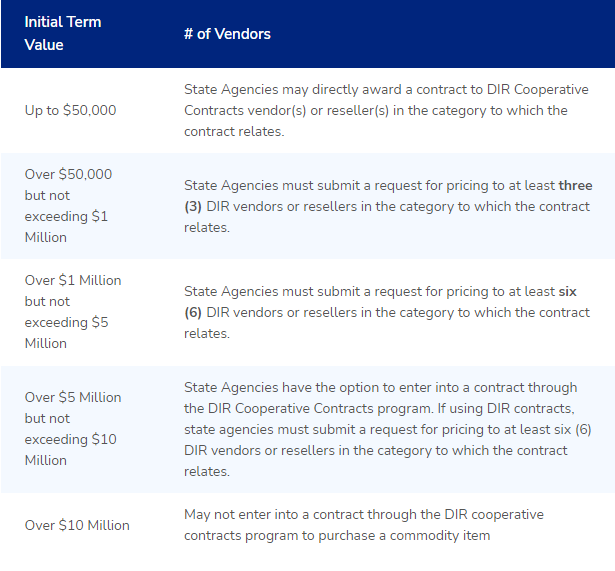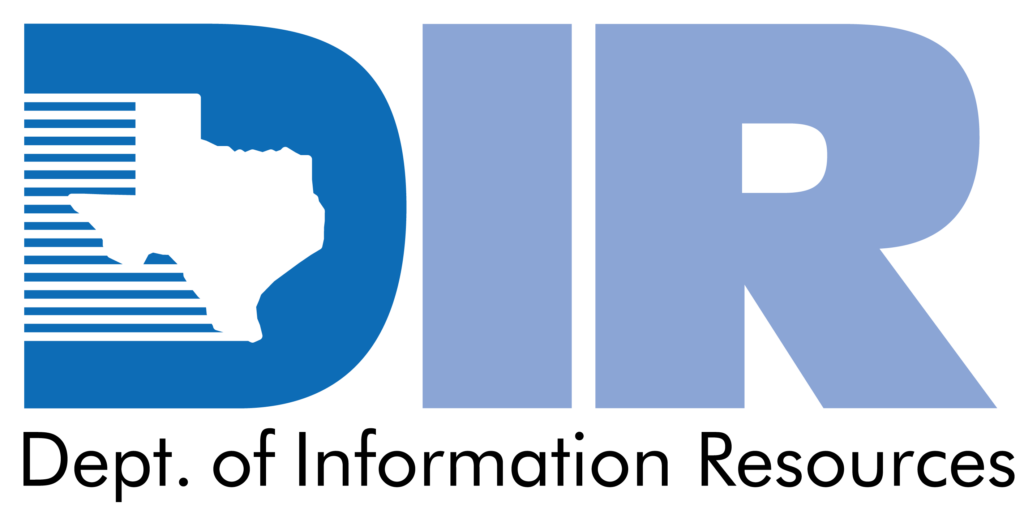Deliverables-Based Information Technology Services (DBITS)
DIR-CPO-4937
Sistema has been awarded a Deliverables-Based IT Services (DBITS) contract by the Texas Department of Information Resources (DIR) through its Cooperative Contracts Program.
Sistema was selected for the following categories:
Application Development, Maintenance, and Support, Technology Upgrade, Migration, and Transformation; and Enterprise Resource Planning (ERP)
- Application Development is the development of new applications which may be mainframe, server, network-based, web-based or a combination and may require interfaces to existing applications. Application Maintenance and Support includes troubleshooting, modifying, maintaining, improving security, and enhancing legacy systems and applications which may be running in a production environment
- Technology upgrade, migration, and transformation may be accomplished by converting/migrating legacy applications to new technology, either with or without new business functionality. It may also include introducing new technology into the enterprise and managing any changes as a result of the introduction.
- Transformation may include assessments of the current application portfolio, evaluation of the technology assets before beginning technology transformation and Business Case development for justification of an initiative. Part of the transformation journey may include planning, analysis, requirements development, proof of concept, deployment, implementation, integration, remediation, data migration, documentation, application programming and support services, and training support.
- Return on investment (ROI), benchmarks, and milestones may also be appropriate to include in a transformation initiative.
- Agile methodology MAY be considered if requesting agency defines the sprint schedule, methodology, and governance which defines the process of developing, communicating, implementing, monitoring, and approving the project phases. Additional areas within scope include the following:
- Website content accessibility compliance;
- Cloud transformation;
- Digital transformation;
- IT organizational transformation; and
- User acceptance testing.
- ERP is an amalgamation of an organization’s information systems designed to automate and integrate a variety of functions, commonly referred to as “back office”, including financials, human resources and asset management. These systems are usually modularized and generally highly configurable. Business Process Reengineering (BPR), system or application changes, implementation, conversion services, and training are often included in an ERP initiative.
Business Intelligence (BI), Data Management, Analytics, and Automation, including Data Warehousing
- BI enables an organization to perform in-depth analysis and includes, where required, data mining of detailed business data providing real and significant information to business users. BI may include an integrated group of operational and decision support applications and databases. BI makes use of tools designed to easily access data warehouse data. A data warehouse collects, organizes and makes data available for the purpose of analysis and gives organizations the ability to access and analyze information about its business. The function of the data warehouse is to consolidate and reconcile information from across disparate business units and IT systems and provide a context for reporting and analysis.
- Road mapping for a data warehouse initiative may include assessment of technology and infrastructure, as-is documentation, business requirements gathering, use case development, and reporting requirements analysis.
- This category includes solutioning data warehouse architectural design, data warehouse processes and sourcing, extraction, transformation, analytics, and loading of data sources; planning, assessment, product installation and tuning; prototype development, deployment, data cleansing, data mart development and support; data migration, integration with data mining; integration with business intelligence tools, artificial intelligence, and/or systems; data scrubbing; data transformation; training and knowledge transfer.
- Data governance planning and implementation, and Business Analytics and Reporting (BAR) is also included in this category.
Project and Program Management
- Project and Program management services include any or all of the project management processes identified by the Project Management Institute (PMI) as published in the most recent edition of the PMBOK® Guide, including practice guides such as Agile and Managing Change in Organizations
- Examples of included services include utilizing the Customer’s tools and processes, using commercially available off-the-shelf tools, using Contract Holder’s own proprietary tools and processes to manage a project, and using the Texas Project Delivery Framework. Information about the framework tool can be found at the following url: https://prod.dir.texas.gov/project- delivery-framework
- This category includes, but is not limited to:
- Business case development;
- Statewide impact analysis;
- Cost to benefit analysis;
- Risk assessment;
- Stakeholder management;
- Organizational change management;
- Strategic planning;
- Program assessment; and
- Agile development, training, coaching.
Combining our DBITS (project) contract with our MBE/HUB certified status, you will benefit from a streamlined process allowing you to get more done with one, local vendor at a significantly lower cost and virtually no red tape.
We can’t wait to start working for you. Please contact us through our online email form below.
Customers purchasing services under this contract shall negotiate pricing directly with the vendor in accordance with the Customer’s Statement of Work.
(Source: DBITS Contract Section 4.a – Customer Price)
How to order:
- Customer creates an SOW for release to vendor(s). The SOW must be complete, signed by an authorized representative of Customer and must be in the form contained in Appendix C.
- Customer Releases SOW to one or more approved DBITS vendor(s) of their choice in the selected category. Response timeline is at the Customers discretion.
- Customer evaluates response(s) and selects a vendor.
- Customer issues a Purchase Order. Vendor understands that no work under any SOW issued by Customer shall commence until receipt of Purchase Order.
- Some additional notes on the delivery and negotiation process:
- Service provided under this Contract shall be based on the Statement of Work form set forth in Appendix C.
- Customers may negotiate the terms and conditions of a SOW to suit their business needs, so long as the SOW terms and conditions do not conflict with or weaken the terms of the DIR DBITs Contract. Vendor shall perform its work in compliance with the DIR DBITS Contract and the agreed upon Statement of Work with Customer.
- Customers purchasing services under the DIR DBITS Contract shall negotiate pricing directly with the Vendor in accordance with the Customer’s Statement of Work.
- DIR SOW threshold amounts:

- May reference “Eligibility Overview”:
- http://dir.texas.gov/View-Contracts-And-Services/Pages/Content.aspx?id=1
You can find out more about how to obtain quotes and place purchase orders by going to:
Texas DIR Deliverables-Based IT Services – Deliverables-Based IT Services (DBITS)

Sistema DBITS Contract
DIR-CPO-4937
For quotes, Statements of Work (SOW), to schedule meetings, etc. with Sistema, please contact:
Sistema Technologies:
Ernesto Cantu
IT Director
(512) 402-7715
Ernesto@SistemaTechnologies.com
1027 E. Riverside Drive
Austin, TX 78704